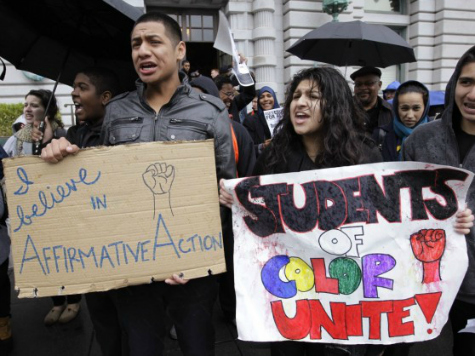
Top Black and Hispanic Democrats in California have vowed to put an initiative to overturn the state’s ban on affirmative action on the ballot by the 2016 presidential election in a move that could potentially shatter what has always been a very fragile coalition of interest groups that make up the state’s Democratic party.
State senators passed a measure (SCA 5) that, if approved by voters, would overturn Proposition 209, the landmark initiative that banned affirmative action in 1996 after just “20 minutes of polite debate.” Sen. Ed Hernandez (D-Wes Covina), the author of SCA 5, pulled it two weeks ago, though, after intense backlash, particularly from the state’s Asian-America community that makes up roughly 14% of the Golden State’s population.
As the Los Angeles Times notes, the backlash was immediate, and it “arose among some Asian Americans who feared their children could lose access to the state’s universities if more places were granted to students from other minority groups.” It intensified on social media, where news of the “proposal to reinstate affirmative action spread mostly among the Chinese community through social networking sites such as WeChat, a Chinese version of Facebook.”
“Let there not be any doubt,” Sen. Ricardo Lara (D-Bell Gardens), the Chair of the Latino Legislative Caucus, told the Times. “The Black caucus and Latino caucus strongly support SCA 5, and we are committed to put something on the ballot in 2016.”
State Sen. Holly Mitchell (D-Los Angeles), who chairs the Legislative Black Caucus, told the Times that she had “deep concerns” about how the bill was pulled.
David A. Lehrer, president of the public affairs group Community Advocates, said Asian Americans, who make up 14% of the state’s population but 30% of the University of California system’s total enrollment, are “obviously disproportionately represented” and would be hurt by the measure more than other groups.
A 2012 survey of California’s Asian Americans found that 75% favored “affirmative action,” but the poll is misleading because it was worded so that Asian Americans could easily confuse race-based affirmative action with affirmative outreach. The question read, “[In order to promote diversity,] do you favor or oppose affirmative action programs designed to help blacks, women, and other minorities get better jobs and education?” The answer to the question would have been a lot different had it read something like, “Do you support race-based preferences at the state’s universities?”
Hernandez said of the Asian-American response to his bill, “I hadn’t thought that would be a constituency that would have a concern.”
However, he soon discovered how intensely Asian Americans felt about the issue and felt compelled to pull the bill. Others in the Democratic coalition of interest groups that often have conflicting interests may soon find out as well.
There are reportedly 1.6 million Asian-American registered voters in California, and more than “42% of those voters are registered or lean Democrat” while “about 25% are registered or lean Republican,” according to the most recent voter data. In 2008, Barack Obama got 64% of the state’s Asian-American voters over John McCain. In 2012, Obama received a whopping 79% of Asian-American voters, which surpassed the 72% he received from the state’s Hispanic voters.
After the debate over SCA 5, Republican state Senate candidate Peter Kuo, “a Taiwanese-born insurance agent,” decided to make “affirmative action the central issue” of his campaign this year in an East Bay district that is, as the Times reports, “heavily Democratic – and nearly 40% Asian American.” If Republican Kuo’s campaign gets traction on the issue in one of the bluest districts, it could be a sign of things to come.
The country, like California, is becoming less white, and those of Asian descent are even outpacing those of Hispanic descent in terms of population growth in some states. Asian Americans can put California in play, tip states like Virginia to Republicans, and be a critical firewall in states like Georgia and Texas in the future.
California has always been a harbinger of what’s to come politically for the rest of the country, and the heated debate over affirmative action indicates that the liberal coalition has plenty of fault lines. The embrace of race-based college preferences by Democrats is something that could compel Asian-Americans to vote for Republicans again.

COMMENTS
Please let us know if you're having issues with commenting.